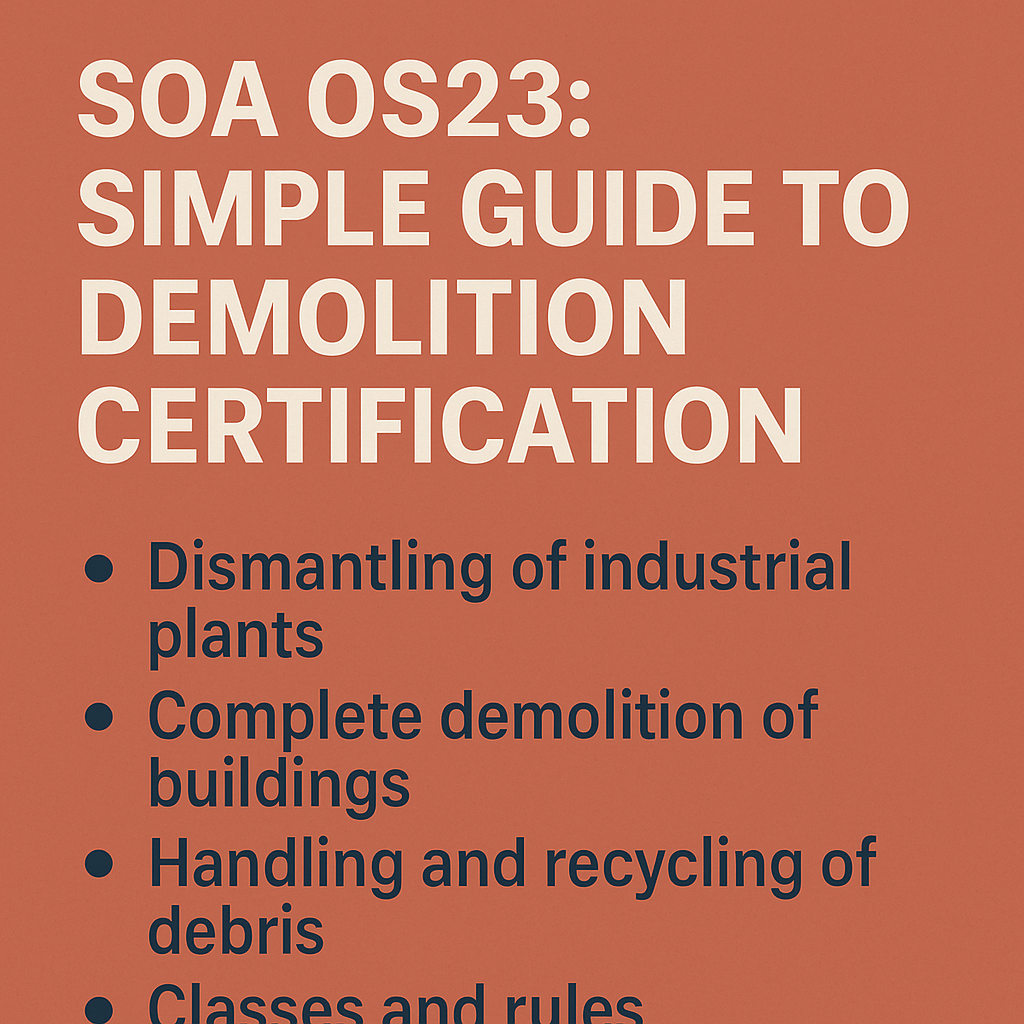In Italy, companies that want to work on public construction projects need a special certificate called SOA. It proves they are qualified and experienced enough to handle certain kinds of work.One of these categories is OS23 Demolition of Works antolohe. This category is about taking down buildings and structures safely and legally.I looked at the top websites that explain soa os23. Most of them agree on the main rules, but each one also adds some extra details. Below is a simple guide that brings everything together.
What soa os23 Means
Every website explains OS23 in the same way ,It covers:
Taking apart industrial plants
Complete demolition of buildings, even using explosives if needed
Cutting reinforced concrete with special tools
Handling and recycling waste materials after demolition
This is written in the law DPR 207/2010, Annex A. That law is the main reference for OS23.
Classes and Limits in soa os23
Each SOA category has classes. These classes show the maximum value of contracts a company can bid for. Here is the list:
| Class | Maximum Value |
|---|---|
| I | 258,000 |
| II | 516,000 |
| III | 1,033,000 |
| III bis | 1,500,000 |
| IV | 2,582,000 |
| IV bis | 3,500,000 |
| V | 5,165,000 |
| VI | 10,329,000 |
| VII | 15,494,000 |
| VIII | Over 15,494,000 |
For example, if a company has Class III, it can bid on demolition projects worth up to €1,033,000.
Is soa os23 Mandatory?
Some categories are mandatory or superspecialistic, which means they need special skills.
But for OS23:
Mandatory? No
Superspecialistic? No
This means companies do not have to get OS23 unless the tender says it is required. Still, having it can give a company more chances to win projects.
Environmental Part of OS23
All websites mention that OS23 also includes managing waste after demolition. This means:
Collecting materials
Separating waste
Recycling or reusing debris
This part is very important because European rules now push for more recycling and less waste. Companies with OS23 are expected to follow these standards.
Why soa os23 is Useful
Even if OS23 is not mandatory, having it can help companies because:
Shows they can handle big and complex demolitions
It proves legal and technical capacity
Helps win public contracts
It allows companies to join projects linked to green bonuses
Common Mistake: Mixing with Tech Term
Some search results for SOA OS23 are not about demolition at all. They are about software and IT systems. These are different and have nothing to do with Italian public works. Companies should ignore those when researching the certification.
FAQs
What is SOA OS23?
SOA OS23 is the certification category for demolition works in Italy. It covers dismantling industrial plants, complete building demolition, cutting reinforced concrete, and managing demolition debris.
Is SOA OS23 mandatory?
No. SOAOS23 is not mandatory and it is not superspecialistic. Companies only need it if a public tender requires it.
What types of projects need SOA OS23?
Projects that include building demolition, dismantling large structures, or managing debris usually require SOA OS23 certification.
Does SOA OS23 include recycling?
Yes. Part of SOA OS23 is collecting, separating, and recycling demolition debris to follow environmental rules.
Why is SOAOS23 useful if it is not mandatory?
Having SOA OS23 helps companies prove technical skills, join more public projects, and stay competitive. It also links to projects supported by bonuses like Ecobonus and Superbonus.
Is SOA OS23 the same as software SOA?
No. Some search results show SOAOS23 as a tech or software term, but this has nothing to do with Italian construction certification.
Conclusion
SOAOS23 is the certification for companies that want to work in demolition projects in Italy.
All sites agree on the main definition: dismantling, demolition, cutting reinforced concrete, and managing waste.
Some sites add details:
SOASemplice explains demolition methods and market demand.
Informagare and ESNA SOA explain the non mandatory and non SIOSS status.
AttestatoSOA and Linea Appalti explain class limits.
BentleySOA points readers to official sources.
For a company, OS23 is a way to prove skill and reliability, even if it is not compulsory. It helps with contracts, improves reputation, and connects to Italy’s eco friendly construction policies.

